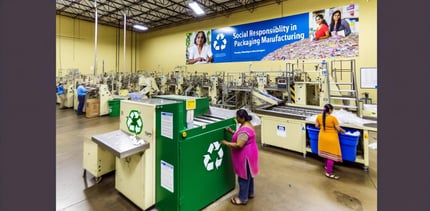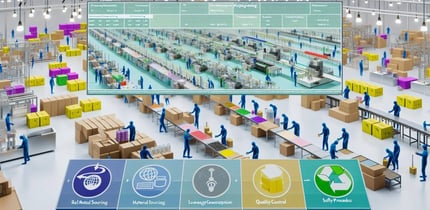Scheduling for Sustainable and Eco-Friendly Manufacturing: Integrating PlanetTogether with ERP, SCM, and MES Systems
Optimize production for sustainability with PlanetTogether integration – ERP, SCM, MES. Green manufacturing made efficient.
Discover how integrating social responsibility into manufacturing scheduling enhances sustainability and community engagement for a brighter future.
In today's interconnected world, manufacturing companies are increasingly realizing the importance of integrating social responsibility into their operations. From reducing carbon emissions to promoting fair labor practices, businesses are striving to align their strategies with ethical considerations. Among the various facets of manufacturing, scheduling plays a crucial role in determining the efficiency and sustainability of production processes.
In this blog, we'll look into the concept of social responsibility in manufacturing scheduling, focusing on its significance, challenges, and practical approaches for Production Planners in packaging manufacturing facilities.

Social responsibility in manufacturing refers to the ethical and sustainable practices adopted by companies to minimize their environmental footprint, uphold human rights, and contribute positively to society. While traditionally, the focus of manufacturing scheduling has been on optimizing production output and minimizing costs, the paradigm is shifting towards a more holistic approach that integrates social and environmental considerations.

Environmental Sustainability: One of the primary pillars of social responsibility in manufacturing scheduling is environmental sustainability. Production planners must prioritize eco-friendly practices, such as minimizing waste generation, optimizing energy consumption, and reducing greenhouse gas emissions. By incorporating sustainability metrics into scheduling decisions, companies can mitigate their environmental impact and contribute to a greener future.
Ethical Supply Chain Management: Another essential aspect of social responsibility is ensuring ethical supply chain management. Production planners need to collaborate closely with suppliers to uphold labor standards, prevent exploitation, and promote fair wages and working conditions. By vetting suppliers and monitoring their practices, companies can ensure that their products are ethically sourced and manufactured.
Community Engagement: Beyond the factory walls, manufacturing companies have a responsibility to engage with local communities and contribute positively to their development. Production planners can facilitate community outreach programs, support local charities, and implement initiatives that enhance the social well-being of nearby residents. By fostering strong community relationships, companies can earn trust and goodwill, enhancing their reputation and brand value.

While the concept of social responsibility is commendable, implementing it in manufacturing scheduling poses several challenges:
Balancing Priorities: Production planners often face the challenge of balancing social responsibility goals with operational efficiency and cost-effectiveness. Striking the right balance requires careful consideration of trade-offs and a willingness to prioritize long-term sustainability over short-term gains.
Data Integration: Integrating social responsibility metrics into existing scheduling systems can be complex, particularly when dealing with disparate data sources and incompatible formats. Production planners may encounter challenges in syncing data from sustainability reports, supply chain audits, and other sources with their scheduling software.
Stakeholder Alignment: Achieving buy-in from stakeholders across the organization is critical for successful implementation of social responsibility initiatives. Production planners must collaborate with various departments, including procurement, operations, and management, to align objectives and garner support for sustainability efforts.
To overcome these challenges and promote social responsibility in manufacturing scheduling, production planners can adopt the following practical approaches:
![]()
Integrated Planning Systems: Leveraging advanced planning and scheduling software, such as PlanetTogether, integrated with ERP, SCM, and MES systems, can streamline operations and facilitate data-driven decision-making. By integrating sustainability metrics into these systems, production planners can assess the environmental and social impact of different scheduling scenarios and optimize accordingly.
Collaborative Partnerships: Building collaborative partnerships with suppliers, customers, and other stakeholders is essential for promoting social responsibility throughout the supply chain. Production planners should work closely with vendors to set sustainability goals, track performance, and implement improvement initiatives collaboratively.
Continuous Improvement: Social responsibility is an ongoing journey, not a one-time destination. Production planners should continuously monitor and evaluate the effectiveness of their scheduling strategies in meeting sustainability objectives. By collecting feedback, analyzing performance metrics, and implementing continuous improvement initiatives, companies can drive positive change and make meaningful contributions to society.
Social responsibility in manufacturing scheduling is not just a moral imperative but also a strategic necessity in today's business landscape. By integrating sustainability principles into their scheduling processes, production planners can enhance operational efficiency, reduce environmental impact, and build stronger relationships with stakeholders.
Through collaborative partnerships, data-driven decision-making, and a commitment to continuous improvement, companies can pave the way for a more sustainable future while delivering value to society.
As production planners, embracing social responsibility is not just about meeting regulatory requirements or appeasing stakeholders; it's about embracing a mindset of stewardship and leaving a positive legacy for future generations.
Are you ready to take your manufacturing operations to the next level? Contact us today to learn more about how PlanetTogether and integrated scheduling solutions can help you achieve your sustainability goals and drive success in the packaging industry.
Optimize production for sustainability with PlanetTogether integration – ERP, SCM, MES. Green manufacturing made efficient.
Discover how predictive maintenance enhances asset reliability in chemical manufacturing with seamless software integration.
Optimize procurement in packaging manufacturing with integrated forecasting tools like PlanetTogether and ERP systems for cost efficiency and...
Be the first to know about new B2B SaaS Marketing insights to build or refine your marketing function with the tools and knowledge of today’s industry.